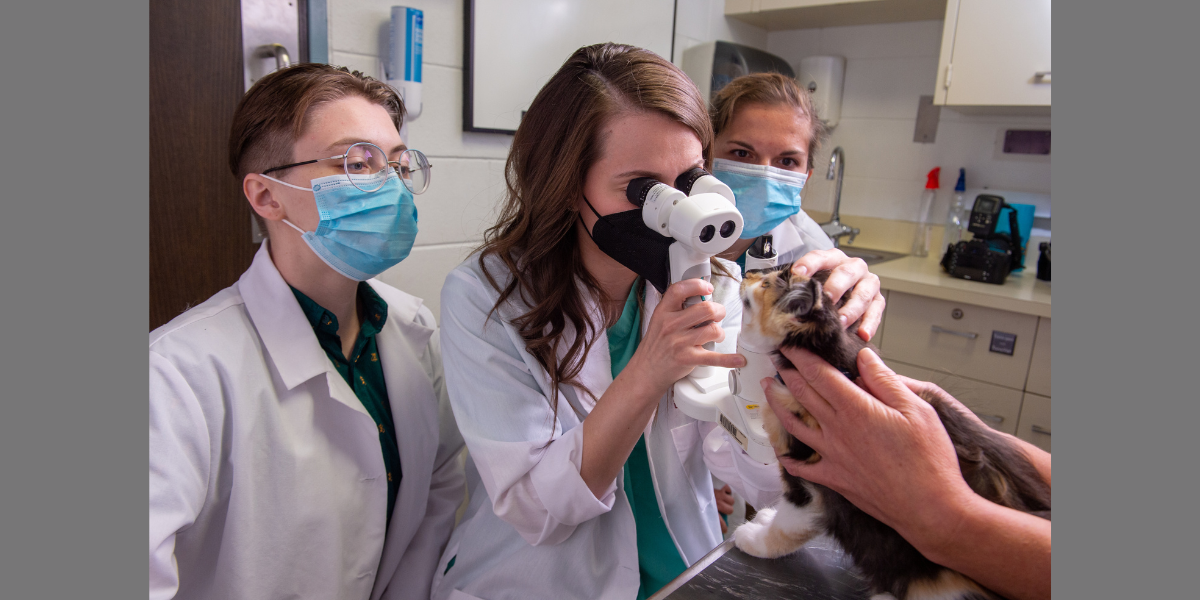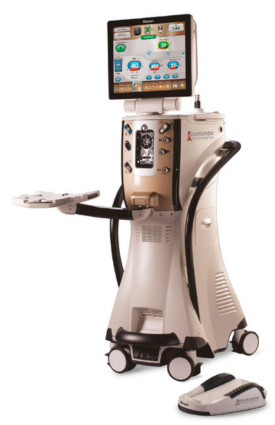Envisioning cutting-edge care
New ophthalmology surgery machine bringing elevated treatment to cataract patients

New ophthalmology surgery machine bringing elevated treatment to cataract patients
Dr. Jordan Roberts (center) performs an exam on a cat. Photo by Steve Woit.
New surgical equipment at the Lewis Small Animal Hospital is allowing clinicians to provide a higher and safer level of care when restoring the vision of patients diagnosed with cataracts.
The phacoemulsification surgery unit, recently purchased in part thanks to donations from clients and individuals, will allow the hospital’s Ophthalmology Service to conduct procedures more effectively, according to Dr. Jordan Roberts, head of the service and an assistant professor at the University of Minnesota College of Veterinary Medicine.
The machine treats cataracts, a condition in which the lens of the eye becomes cloudy and has a negative impact on vision. Both humans and animals can develop cataracts. The new surgical unit typically is used for human patients but can treat cataracts in animals.

“The unit is one used by more than 80 percent of human cataract surgeons in the United States,” Roberts says. “It is a very nice, state-of-the-art piece of equipment that is safer and results in fewer complications for patients.”
Operating on eyes requires utmost precision due to their small size and delicate structure. A phacoemulsification unit supports these needs by enlarging the surgeon’s view and providing a needle tool that breaks up the cataract and suctions it from the eye.
Compared to the previous machine, the new phacoemulsification unit has more capabilities and safety features, allows patients’ eyes to expend less energy during procedures, and is more environmentally friendly with less waste produced during procedures.
If you’re interested in learning more about cataracts and their treatment in pets, you can watch Roberts’ Animal Health Education Series presentation, “Canine Cataracts: What Can be Done?” The presentation includes an overview of cataracts, advised treatment, and a video of cataract surgery.
The purchase of this cutting-edge technology was made possible with the help of charitable gifts. Philanthropy enables the Lewis Small Animal Hospital, which is part of CVM’s Veterinary Medical Center (VMC), to access the latest technologies and enhance physical spaces for improved patient care.
“Not everyone knows that the Veterinary Medical Center has a not-for-profit mission,” says Will Haugen, development officer for the VMC. “If you are in a position to contribute, please know that gifts of any size make it possible for clinicians like Dr. Roberts to invest in the latest technology across our small and large animal hospitals for the benefit of patients.”
If you’d like to make a positive impact on the care of animals treated at the Veterinary Medical Center, contact Will Haugen at hauge442@umn.edu or 612-625-7714 for more information about ways to give.